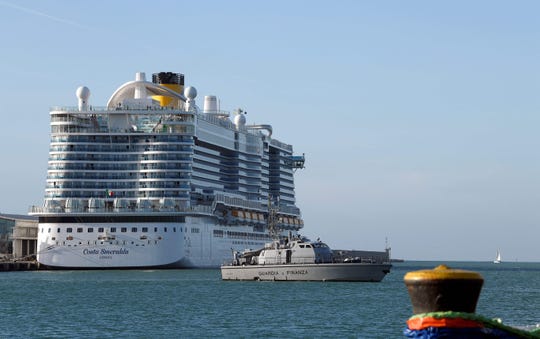Canceled Flights, Quarantined Cruises
Cruise on lockdown, flights stopped: Why risk of Americans getting coronavirus at airports, cruises, theme parks is still low
 The cruise ship Costa Smeralda is seen moored at the port of
Civitavecchia after a passenger fell ill with a high fever on January 30, 2020
in Rome, Italy. About 6,000 cruise ship passengers are quarantined after a
Chinese woman showed symptoms of a new coronavirus. (Photo by Baris Seckin /
Agence Anadolu via Getty Images) Agence Anadolu
The cruise ship Costa Smeralda is seen moored at the port of
Civitavecchia after a passenger fell ill with a high fever on January 30, 2020
in Rome, Italy. About 6,000 cruise ship passengers are quarantined after a
Chinese woman showed symptoms of a new coronavirus. (Photo by Baris Seckin /
Agence Anadolu via Getty Images) Agence Anadolu
The US State Department has told Americans not to travel to
China on Friday because of the coronavirus epidemic that has infected more than
10,000 people worldwide and killed more than 213 people.
This comes after a cruise ship was stopped Thursday in Italy
because a passenger from Macau developed fever and respiratory symptoms. (It
was then determined that it was not a coronavirus.) And airlines, including
Delta, American Airlines and United, have reduced the number of flights to
China. British Airways canceled all flights to mainland China for one month.
So what does this mean for Americans traveling to or visiting crowded tourist spots?
While the director general of the World Health Organization,
Tedros Adhanom Ghebreyesus, said on Wednesday that "the continuing
increase in cases and evidence of human-to-human transmission outside of China
is, of course, the most deeply worrying" , the immediate risk of this
virus for Americans. is still considered weak, the CDC announced on Thursday.
 In other words, the United States has had time to be
proactive and to prepare for the arrival of the coronavirus, which is one of
the reasons why experts say that Americans can be calm.
In other words, the United States has had time to be
proactive and to prepare for the arrival of the coronavirus, which is one of
the reasons why experts say that Americans can be calm.
"If you give a virus a head start and hide it in the
middle of the flu season, it will spread more widely," says Adalja,
describing how the coronavirus started to spread in China. But the Centers
for Disease Control have been proactive from the start, putting in place
protocols to screen travelers returning from China, and providing information
to clinicians on how to be alerted to the virus, he said.
Global travel restrictions and blockages in China have been
put in place to prevent the spread of the virus. At 20 airports in the United
States with quarantine stations, passengers from China will be screened for the
virus and health officials will decide if it is safe for them to enter the
United States, according to the CDC.
So if you have a flight or cruise scheduled outside of
China, there's no need to cancel, says Amesh Adalja, senior researcher at Johns
Hopkins University Center for Health Security and member of the Infectious
Disease Society of America, at CNBC Make It.
The same is true for highly populated areas, such as theme
parks or shopping malls, says Adalja. In China, popular tourist sites such as
the Forbidden City in Beijing and the Walt Disney Disney complex in Shanghai
have closed until further notice in response to the epidemic.
Popular Tourist Sites:
And for public transportation like buses or subways in the
United States, the overall risk of coronavirus is low, says Gottlieb.
Of course, people should always follow standard respiratory
hygiene practices, including washing their hands with soap and water for at
least 20 seconds or using an alcohol-based hand sanitizer, suggests the CDC. If
you are sick, you should stay at home, cover your cough, and clean any surfaces
that you touch frequently. And if you have visited China in the past 14 days
and you develop fever, cough or breathing difficulties, the CDC says that you
should consult a doctor and inform your doctor about your trip before going to
the doctor's office or emergency room.
"There are other viruses circulating, so if you get
colds and flu symptoms, it's more likely that it will be one of these viruses,
not this new coronavirus," says Adalja. Influenza activity is considered
high in the United States and will likely continue for weeks, according to the
CDC.
Ultimately, information grows rapidly on the coronavirus, so
it's wise to be vigilant and watch for any changes, says Adalja. "But for
now, it is not a major threat to the average American," he said.
The virus first appeared in Wuhan, China on December 31.
Although there are still many questions about how the virus spreads and how it
behaves, it is thought to spread from person to person through respiratory
droplets. The first human-to-human transmission of the virus in the United
States was detected on Thursday in Chicago, making the United States the fifth
country in which the virus is spread between humans.




0 Comments